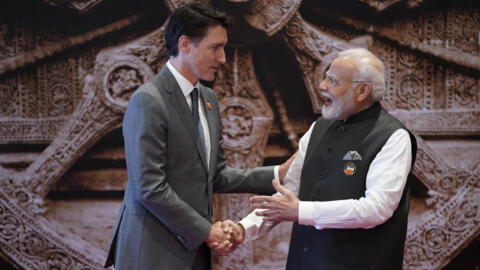In a recent diplomatic dispute, India has strongly refuted allegations made by the United States and Canada regarding its involvement in plots against pro-Khalistan separatist figures. The charges have come at a time when Washington and Ottawa have shared what they describe as “credible information” implicating an Indian official in targeted actions against these separatists. India, however, has dismissed these claims, calling the discussions an “ambush” by both North American countries. As the diplomatic spat unfolds, it raises critical questions about the future of India’s relations with these allies and the broader impact on international geopolitics.
Overview of the Allegations
The controversy emerged following a series of high-stakes meetings between officials from India, the US, and Canada. Reports suggest that American and Canadian representatives presented evidence during these meetings, alleging that an Indian government official had a role in transnational activities against Khalistan separatist leaders based in the US and Canada. These allegations come against the backdrop of the longstanding issue of the Khalistan movement—a separatist campaign advocating for a Sikh homeland in India’s Punjab region.
While the movement has limited support within India, it has found pockets of sympathy in countries like Canada, home to a significant Sikh diaspora. Over the years, this has often been a source of friction in India-Canada relations, with New Delhi expressing concerns over perceived leniency towards pro-Khalistan elements in Canada.
India’s Strong Rebuttal
India’s reaction to the allegations was swift and firm. Official sources from New Delhi described the meetings as an “ambush,” emphasizing that the information shared by the US and Canada lacked credible evidence. India’s Ministry of External Affairs (MEA) has rejected the accusations, maintaining that the country does not engage in extraterritorial actions against individuals and that its focus remains on counter-terrorism within the framework of international law.
A senior Indian official, quoted by The Indian Express, underscored that the discussions lacked transparency and were intended to corner India diplomatically. The MEA has also accused the US and Canada of not adhering to standard diplomatic protocols, turning a sensitive matter into a public controversy without allowing due process. This firm stance reflects India’s broader policy of defending its sovereignty and rejecting what it perceives as interference in its internal affairs.
US and Canada’s Perspective: Focus on ‘Credible Information’
From the perspective of Washington and Ottawa, the allegations are based on intelligence reports that they deem credible. Canadian authorities, in particular, have been vocal about their concerns, with the Acting High Commissioner to India, Stewart Ross Wheeler, being actively involved in discussions with Indian counterparts in New Delhi. The presence of the US in these discussions adds a layer of complexity, signaling a coordinated stance by both North American nations against India on this issue.
While the US has refrained from making specific allegations publicly, it has reiterated its stance on global counter-terrorism efforts. The emphasis on credible intelligence and transparency is seen as an attempt to hold India accountable for actions that could destabilize the region. However, the absence of public disclosure of the details behind these claims has led to skepticism from some quarters about the motivations behind this diplomatic pressure.
Impact on India-US and India-Canada Relations
This diplomatic row comes at a delicate time in India’s relationships with the US and Canada. Both countries have been important partners in trade, defense, and international diplomacy, especially in the context of the Indo-Pacific strategy and countering China’s influence in the region. Yet, the allegations threaten to derail recent efforts to strengthen trilateral ties, casting a shadow over strategic initiatives.
For India, the fallout with Canada is particularly significant, as it has a large Indian-origin population and is a key destination for Indian students and professionals. The Trudeau administration’s willingness to address issues raised by pro-Khalistan groups has been a sore point in bilateral relations for some time. By raising these new allegations, Canada risks further straining ties with India, which could impact trade and cooperation in areas like education and technology.
In contrast, India’s relationship with the US has grown closer in recent years, marked by strategic defense deals and alignment on regional security issues. However, the current tension could introduce complications in collaborative initiatives like the Quad, which includes India, the US, Japan, and Australia. Any prolonged diplomatic dispute could potentially shift the dynamics of these alliances, even as both countries recognize the value of their strategic partnership.
Khalistan Movement and India’s Position
The Khalistan movement has long been a point of contention in India’s foreign policy, especially in dealings with countries that have large Sikh communities. India has consistently maintained that the movement is fueled by a small, vocal minority based outside its borders. New Delhi has urged countries like Canada to take a tougher stance on activities that promote secessionist ideologies.
The Indian government’s focus has been on ensuring national security and combating terrorism, which it sees as a fundamental right. It views any international allegations of this nature as attempts to undermine its sovereignty and internal stability. By rejecting the claims, India is reinforcing its stance that it will not tolerate any external pressure that challenges its security measures.
The diplomatic tensions between India, the US, and Canada over allegations of a plot against pro-Khalistan separatists have escalated into a significant international dispute. As Washington and Ottawa emphasize the credibility of their intelligence, India has stood firm in denying any involvement and dismissing the accusations as an “ambush.” The situation has serious implications for the future of India’s relations with these countries, potentially affecting trade, cooperation, and strategic alliances.


Leave a Reply